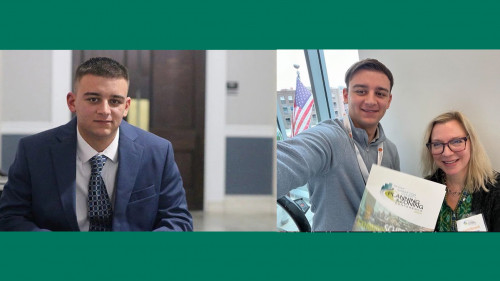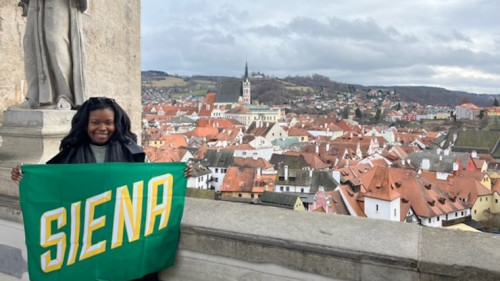
They attended what was supposed to be just another campaign town hall, and ended up all over national news.
The week of January 7, eleven students in the Presidential Nominations class taught by Kevin Baron, Ph.D., assistant professor of political science, headed to New Hampshire to get some field experience before the January 23 first-in-the-nation primary. They took part in door-to-door canvassing, phone banking and attending rallies for presidential candidates of both parties.
“The goals of the class are to provide students with a thorough understanding of the presidential nominations process from both an academic and applied perspective,” explained Baron. “While students can read all the latest political science research on nominations and primary elections, getting them into the field to work on presidential campaigns provides them with a fuller understanding of what goes into running them.”
Travis Brodbeck of the Siena College Research Institute is co-presenting on polling for the course. He said it was exciting to see the students gain a more nuanced perspective on how to interpret polling, especially in political primaries.
“By being the ‘boots on the ground’ talking to voters, the students engaged in their own form of convenience sampling and got a read on what New Hampshire residents were thinking about,” said Brodbeck. “From door knocking to phone banking, students had chances to hear the reasons why voters supported candidates rather than the flat horse race number talked about in polls.”
So, about that town hall: The class arrived at the Searles School and Chapel in Windham, NH on January 11, expecting to hear Chris Christie give a stump speech to supporters and the media. They were ushered to seats behind Christie and directly in front of an American flag, in full view of the audience and cameras. They had heard some rumors about the end of his candidacy that day, but when no one was given a “Chris Christie for President” sign to hold they realized the buzz was true.
It was that evening that the former New Jersey governor announced he would end his quest for the White House. And on every network and in every major paper and X account, there were shots of the Siena students right behind Christie.
The national media hits were just a small (albeit unexpected) part of the students’ weeklong experience. They spoke directly with voters, campaign workers and candidates to get a wide-ranging perspective on the early stages of an American presidential campaign.
“My biggest takeaway from New Hampshire was how invested people are in politics there,” said Amelia Risinit ’24. “Everyone is willing to hear different perspectives and cares about their vote.
Daniel Berger ’24 was also impressed by the political involvement of the Granite State’s residents.
“They truly value government, especially when you consider their state legislature is made up of 400 individual representatives,” he said. “No matter where we went for the primary trip, there were politicians present and messaging everywhere.”
Sean Cunniffe ’25 noted that the small size of the state allows candidates the opportunity to reach out to a large percentage of voters.
“New Hampshire is a place where anyone can run for president and win a primary election,” he said. “It’s small enough so that a candidate can go into every town, shake every hand, and make a real connection with voters.”
The students realize that not everyone is a political junkie, but they encourage their fellow Saints to take part in electing the people who represent them, and not only at the national level.
“This willingness to engage in politics is something I hope to emulate in my own life, and I hope that we can all muster a similar desire here on campus and in the people around us,” said Braden Tims ‘26. “Our political system affects each and every one of us. Our government was established to serve our interests and if we as voters have an understanding of how our governmental system works, we can make sure that it continues to function in a way that benefits all of us.”
Melanie Osborn-Smith ’25 encourages other Siena students to find a topic they’re passionate about and research how politics affects it.
“Not everyone wants to be involved in politics or wants to spend the time on it, but once you find a place to start, it usually generates more interest,” she said.
Tim Nigro ’25 said the trip illustrated the old adage that “all politics is local” – even when it’s a national race.
“This may sound odd at first, but when you see firsthand a presidential campaign run by only a handful of hopeful individuals in everyday American neighborhoods, you learn this to be true,” Nigro said. “The work we did in New Hampshire proved that boots on the ground for a campaign is extremely powerful.”
Other students taking the course this semester include Nicole Lippolis ’24, Alexander Page ‘24, Christian Reynolds ‘25, Charlie Szumita ‘25, and Parker Taft ’24.
The class held a watch party (with pizza) the evening of January 23 to wait for the results of the New Hampshire primary. As expected, Donald Trump won the most Republican delegates, with former United Nations Ambassador Nikki Haley coming in a respectable second. President Joe Biden won for the Democrats with a write-in campaign.
Baron joked during the first back-on-campus meeting of the class that “it’s all downhill from here” in terms of interesting course content.
“What stood out most for me on the trip was seeing the students interacting with powerful and connected people, while also doing the more mundane work of day-to-day campaigning,” he said. “It is the yin and yang of presidential primary politics, and students got to see that running a campaign is far less glamorous than they expected.”
Like his students, Baron encourages everyone to use their right to vote.
“Voting is the foundation of any democracy and a free society. Politics and policy impact our lives every day whether we realize it or not,” he explained. “Many are quick to complain about our government, but voting is the mechanism we have for choosing those who run it and make decisions on our behalf that impact us in the U.S. and with the rest of the world. Every vote counts, and never let anyone tell you that your voice does not matter.”

